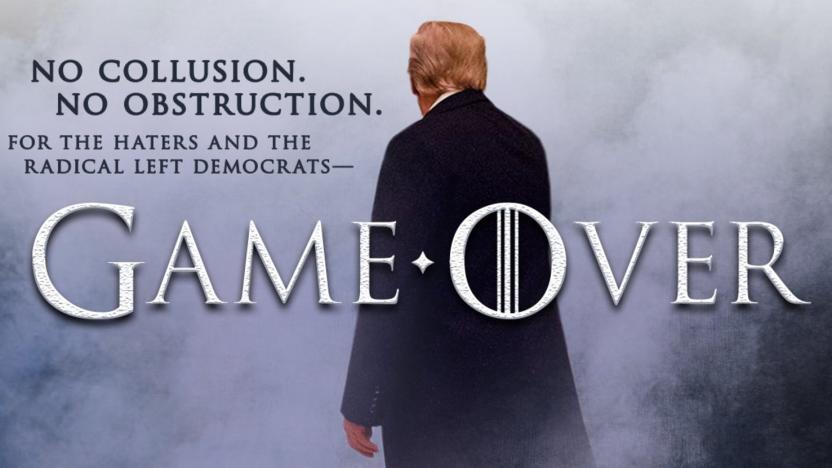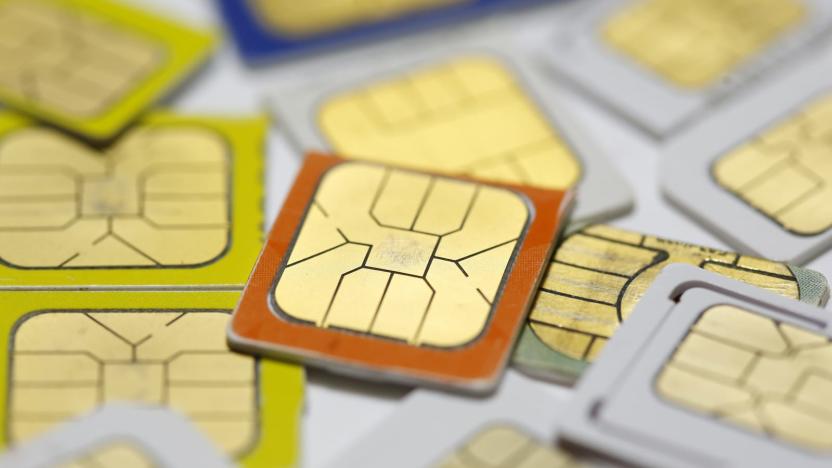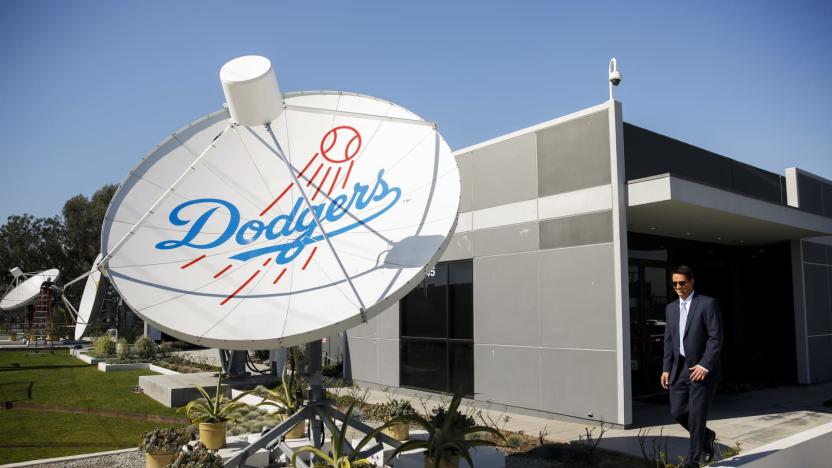collusion
Latest

HBO isn't happy about Trump's Game of Thrones-inspired tweets
With the Mueller report finally making its way into the hands of the public, President Donald Trump was quick to claim victory and declare an end to the collusion and obstruction of justice scandals that have loomed over his presidency over the last two years. He did so in typically abrasive fashion, with a tweet aimed at his "haters and the radical left Democrats." However, HBO isn't too happy he mimicked Game of Thrones imagery with the use of "game over" and a font similar to one used in the show.

EU believes BMW, Daimler and VW colluded over clean emissions tech
The European Commission believes BMW, Daimler and Volkswagen worked together to delay clean emissions technology. Last fall, the EU Commission launched a formal investigation to determine if the automakers breached EU antitrust rules by restricting competition on the development of emissions-reducing technology. Now, in a Statement of Objections, the Commission has informed BMW, Daimler and VW of its "preliminary view" that they did in fact violate antitrust rules -- meaning they also led to higher emissions and denied consumers the opportunity to buy less polluting cars.

EU probes BMW, Daimler and VW for colluding over clean emissions tech
The European Commission has opened a formal investigation to determine whether BMW, Daimler and VW colluded to avoid competing with each other on clean emission technologies. The EU is assessing whether the companies met to limit the development of catalytic systems that reduce nitrogen oxide diesel emissions and particulate matter ("Otto" systems) from gas-powered cars.

GSMA puts eSIM work 'on hold' due to US collusion investigation
Don't expect to see embedded SIM technology in your phone any time soon. The GSMA, which oversees key cellular standards, has placed eSIM spec work "on hold" while the US Department of Justice investigates the possibility of collusion between AT&T, Verizon and the GSMA to stifle the card-free technology. The GSMA didn't offer an explanation of why it was pausing development, and instead stressed that American eSIM users would need to "explicitly consent" to a carrier-locked eSIM (such buying a phone on contract).

DOJ sues DirecTV for conspiring against LA Dodgers (updated)
The Department of Justice announced on Wednesday that it is bringing suit against DirecTV for its role in an alleged collusion scheme involving the broadcast rights to Los Angeles Dodgers games. Specifically, the DOJ asserts that DirecTV and three of its competitors -- Cox, Charter and AT&T -- shared "agreed to and did exchange non-public information about their companies' ongoing negotiations" with SportsNet LA, the only channel authorized to show Dodgers games.

Samsung worries that its Microsoft royalty payments amount to collusion
Samsung was quick to cite the acquisition of Nokia as a reason for holding out on Microsoft's royalty payments, but there weren't many details. Just what had it spooked? Thanks to some new court filings, we now have a clearer sense of its motivations. Simply put, the Korean tech giant is worried about "charges of collusion" now that Microsoft is a direct competitor in the smartphone business. The patent deal requires that Samsung not only make Windows Phones, but hand over sensitive business details -- both big problems when Microsoft could use them to gain a competitive edge. Samsung already stopped handing over those trade secrets over jitters that American antitrust regulators would step in.

Firefox plugin reveals how your internet browsing is being monitored
If someone screams "they're watching you!" into your face, then you're either starring in a horror movie or living in these surveillance-conscious times. Still, if it's the latter, at least now you can put a name to the faceless entities observing your every move. Mozilla has released Lightbeam, a Firefox plugin that visualizes which sites are tracking your browsing history and how those sites are connected. Based on the experimental Collusion add-on, the software will even show you which third-party tools and personalization trackers are watching you from afar. All you need to do to get learning is download the feature from the source -- just remember to pull your best Enemy of the State face when you see the tangled web that just a few minutes of browsing will weave.

Samsung, LG and Pantech, among others, fined $40 million in Korean price fixing scam
The truth in advertising is that there is none -- it's mostly all smoke and mirrors. But sometimes those illusory promises have real-world criminal intent behind them, like this latest ruling from the Korean government's corporate regulator. In a decision handed down earlier today, that governing body found mobile phone makers LG, Samsung and Pantech, in addition to operators KT, SK Telecom and LG Upius guilty of price fixing. In what's been framed as a case of consumer fraud, the OEMs reportedly inflated the associated costs of handsets, which were then marketed with supposed discounts by the colluding carriers. Collectively the group's been ordered to pony up about 45.3 billion won (or $40.2 million) in fines, with the largest of those penalties belonging to Samsung at 14.2 billion won (about $12.6 million) and SK Telecom at 20.2 billion won (about $18 million). Adding further insult to this public injury is the FTC, which has taken the extra step of imposing sales restrictions that are intended to prevent the involved parties from committing future infractions. Check out the source below for the full scoop on this corporate back-scratching.

DRAM cartel settles with European Commission, will pay €331 million fine
When the U.S. Department of Justice brought an antitrust suit against PC memory manufacturers in 2002, the RAM you see above wasn't even a twinkle in an engineer's eye... but seven years after Micron revealed the existence of a price fixing cartel and four years after Samsung sent three executives to jail and paid a $300 million penalty, the European Commission has slapped DRAM manufacturers with yet another fine. Those who 'fessed up early were partially let off the hook, but Infineon and Hynix will shoulder €57 million and €51 million respectively, while Samsung owes Europe a cool €145 million for its role in the scandal. Of course, for a company that counts a quarterly $459 million in profit during an off year, we're talking about another slap on the wrist.

The art of pricing
I hear this all the time: "Hurrr! Undercutters are ruining this market! Durrr!". Today, we're going to talk about this. Undercutting doesn't ruin markets, high supply does. Also, if it's still profitable, the market's not ruined, it's just being taken away from you. Cut your margins and undercut back. Or buy them out if you still think they're wrong and you're right. But markets should be protected from undercutters! Balderdash. Markets are a place where people can sell their goods for any price they want. You're describing collusion between sellers to reduce "lost profits," where every time someone wants to undercut with a new auction, they do so by the smallest possible amount. More often than not, all your competitors will have the same cost that you do, and as soon as they see you commit to an auction, they'll undercut you right back. If everyone is knocking a copper off the next highest auction, they only way to undercut successfully is to try camp the AH and make sure you're always the competitor who has visited most recently. Needless to say, this is a colossal waste of your time, and you would probably make more money per hour doing argent tourney dailies. The only way to effectively sell your product in a market with a lot of competitors is to undercut by more than just a trivial amount. You need to make it just cheap enough that your competition is less likely to undercut you, but expensive enough that you're still making money.

LCD price fixing investigation reaches $860 million in total fines, Chi Mei latest to 'fess up
It's not every day we get to cite an official US Department of Justice news release, so it's with a certain glee that we can announce the US taxpayer was last week enriched by another $220 million courtesy of the not-so-fine folks who swindled him out of that money in the first place. Joining the ignominious ranks of LG, Sharp, Hitachi and Chungwa Picture Tube, Taiwanese manufacturer Chi Mei is refunding the US state for the pecuniary impact of its collusive practices, which were primarily related to keeping prices artificially high and profits proportionately inflated. US companies directly affected by these ignoble activities include HP, Dell and Apple, but don't you worry, AT&T has already started the inter-corporation scuffle, with Nokia piling on for good measure. Man, it almost seems like crime doesn't pay.

Nokia sues LCD manufacturers for alleged price fixing (update: joins AT&T)
Price fixing is nothing new in the LCD panel business. Hell, collusion is pretty common across the entire consumer electronics industry though it's difficult (and costly) to prove. Now Nokia, the world's largest maker of cellphones, is suing a who's who of Asian LCD manufacturers alleging a ploy to fix prices on handset LCDs. The November 25th filing in the U.S. District Court for the Northern District of California, San Francisco division, names Samsung Electronics, LG Display, Sharp, Hitachi, and Chunghwa Picture Tubes as co-conspirators. Nokia, of course, is seeking cash and injunctive relief to remedy damages incurred and has the dubious honor of following another high-profile move launched against Apple just last month. With Nokia's high-margin smartphone sales waning against stiff competition, it's easy to understand why its execs would be miffed if they paid artificially high prices for panels considering the sheer volume of lower-priced handsets Nokia sells at razor thin margins. Update: Just dawned on us that this lawsuit (which we now know claims an 11 company cartel operating from "at least" January 1, 1996 until Dec 11, 2006) joins the AT&T action kicked off in October. Pile on! Nokia has also filed suit in the UK against both LCD and CRT makers.

Hitachi and Toshiba subpoenaed in DOJ optical drive price fixing probe
We kinda knew that there couldn't be any antitrust smoke without the fire of market collusion, and sure enough, Sony Optiarc has been joined on the naughty step by Hitachi-LG Data Storage and Toshiba Samsung Storage Technology Corp. As the names should tell you, these are joint ventures involving some of the world's biggest electronics manufacturers, whose American optical drive divisions appear to be under suspicion of fixing prices. We'd have expected Hitachi and LG to wise up after paying out fines for LCD price fixing recently, but when you look at Hitachi's stock trading up after this news -- with traders confident any forthcoming fines will be too small to dent the company's bottom line -- maybe "by hook or by crook" is actually a viable business plan?

Palm's Colligan rebuffs Steve Jobs' 'likely illegal' plea to stop hiring from Apple
Imagine the scene two years ago, August 2007 to be precise. Palm was busy preparing to launch its Foleo and the OS that would save Palm was still expected to be coming from ACCESS. In fact, things were looking so bad for Palm in August that we penned an intervention letter that then CEO Ed Colligan responded to. Apple, for its part, was still enjoying the glow of the golden halo rising above its iPhone launched just over a month prior with the help of 2% of Palm's hired workforce, according to Bloomberg. Oh, and Apple had just lost Jon Rubinstein, the man leading its iPod division, to Palm.Now Bloomberg is reporting that Steve Jobs approached Palm's Ed Colligan in August 2007 with a proposal to refrain from hiring each other's staff (read: quit poaching our employees, Ed!). Colligan refused, saying,Your proposal that we agree that neither company will hire the other's employees, regardless of the individual's desires, is not only wrong, it is likely illegal.Meeeow.

DKP pitfalls and how to jump them
Kree's got a nice set of posts about some of the more advanced problems with a DKP system in his guild (he calls them pitfalls, which works very well as a metaphor). I've never been part of a really serious DKP system, but just like with any other economy, DKP can lead itself to imbalances if you aren't careful with how people are getting and spending points.Inflation is definitely a problem I've seen in other guilds -- usually, with DKP, you have a few very consistent raiders, and everyone else can fall behind. And eventually you get a few folks with tons of DKP, so much so that they can outspend everyone else and basically dictate how gear drops. Kree's solutions are good, though -- he offers up "point rot" (points devalue over time, so you can't save up tons of them at once), and a point cap (though even that can cause problems, as people are forced to spend DKP on gear they don't need rather than losing them). The other issues, collusion and upbidding, don't happen quite so often (both of those require players to be rather malicious, and in guilds where everyone knows which gear they should and shouldn't use, you don't usually have an issue), but he's got some good solutions there as well.DKP was designed to make sure passing out drops is fair, and Blizzard has put all sorts of rules and restrictions in the game to try and get raiders the gear they need without a lot of fighting. As long as your guild remembers that there's always more gear to go around and that no one piece is worth stealing or causing trouble over, a good, balanced DKP system can help you avoid these alligator-filled pitfalls pretty easily.






